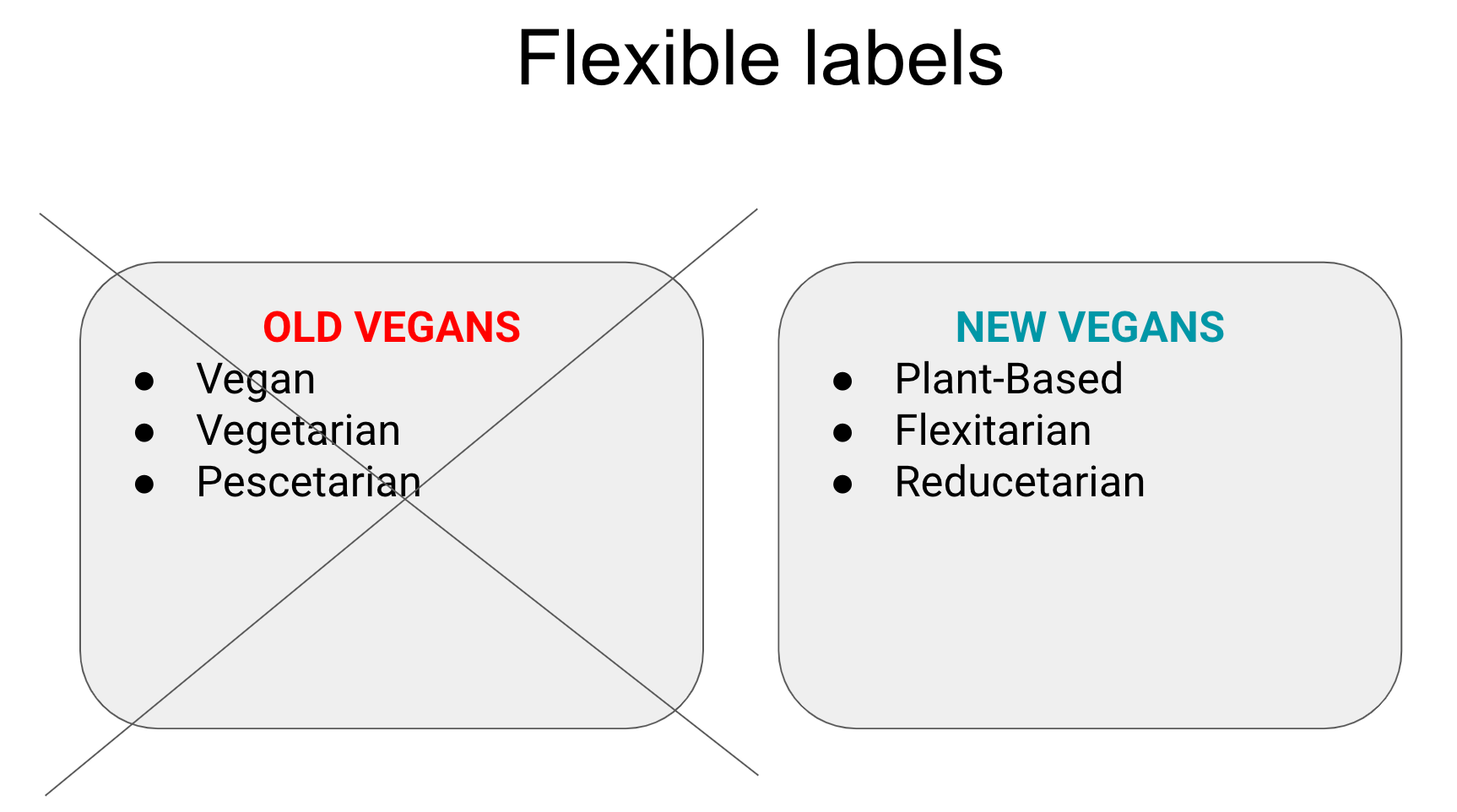A Vegan’s Case Against Veganism

Seven years ago, I made the decision to go vegan (no consumption of animal products) for ethical reasons. The logic was simple:
- Needlessly torturing sentient animals is wrong
- Almost all meat we eat today in the US comes from needlessly tortured animals
- Humans can live at least as healthy and fulfilling lives without eating meat
But while I firmly believe veganism is the right ethical decision, I think the traditional vegan movement (ex: PETA) has been counterproductive to the actual goals and we should consider dropping the label of veganism entirely.
More broadly, I’ve learned that the traditional vegan movement’s focus on moral shaming does not work and enforcing binary labels (ex: vegan) does not help in changing people’s behavior.
Instead we need to:
- Use more flexible labels instead of vegan which remove the binary way of thinking
- Change the culture and make people associate veganism with positive things, not negative ones
- Convince people to reduce animal consumption by creating better products through innovation, not by making them ok with inferior ones.
Thankfully, there is already a growing movement supporting this new approach which I’ll call the “New Vegan” movement.
End the binary labels
It’s fairly obvious that if you think people should eat fewer tortured animals, like I do, then it’s much better to 1) have a lot of people reduce their consumption by 50% than 2) have a small number of people reduce their consumption by 100%.
For some reason, the traditional vegan movement has gone with option 2. But very few people are willing to cut consumption by 100%, and this often discourages them from reducing consumption by even 1%. The labels themselves are key here. There is a label for someone who cuts animal product consumption by 100% (vegan) but there is no common label for someone who does by 50%.
Instead of binary labels, we need flexible labels. Thankfully, we’ve started to see new ones sprout up in the “New Vegan” movement. “Plant-based” has become the go-to for people who are either vegan or mostly vegan. “Reducetarian” and "flexitarian” are other labels which are less well known but are clear in allowing for some animal products while still trying to reduce consumption overall.
We're used to this flexibility in a lot of other labels. “Environmentalist” doesn’t mean never flying a plane or driving a car. It just means taking actions in the right direction.

Flexible levels also encourage more sustainable behavior. If you wanted to become a bodybuilder, you probably wouldn’t try to bench 225 on your first time at the gym. But many people attempt to do the equivalent by going fully 100% vegan within a short period of time. And because the binary labels give no room for flexibility, “breaking” once often leads them to give up on the entire effort. If you need to have your Grandma’s chicken when you visit her, that doesn’t mean you should just give up entirely on cutting out animal products.
Even though I call myself vegan for simplicity and practicality, I also adopt a more flexible approach. Am I perfect 100% of the time? Definitely not.
I can’t remember accidentally eating meat, but I’ve definitely made exceptions for dairy and eggs. I actually found one farmer (Gail!) who I think treats her chickens well, so I’ve incorporated her eggs into my diet. And on Shabbat, I also will eat Challah with egg because it’s an important exception to me.
On a couple occasions with friends, I’ve even gone to the lengths of trading animal consumption. If my friends want to order vegetarian food (has dairy/egg) for the table and not order vegan food, I’ll agree to go vegetarian that meal in exchange for them going vegan for multiple meals (ex: they need to go vegan for 5 meals). That way, there's still a net reduction in consumption.
While some of this may seem silly, it’s how I’ve made my practice sustainable and make veganism seem easier to the outside (an important aspect I’ll discuss later in this piece). None of these “transgressions” have led me to fall off the wagon.
Use carrots, not sticks, to get people to change
In Atomic Habits, James Clear argues that one of the keys to building a lasting habit is to make that habit attractive. If the habit is unattractive, we likely won’t have enough willpower to do it over and over.
The same applies to convincing someone to change their behavior. Instead of making going vegan attractive, traditional activist organizations like PETA have used moral shaming to make people feel bad about their existing diets. But moral shaming does not work, otherwise you would probably have changed your behavior by now. Shaming instead causes people to get defensive and often backfires.
How do we make cutting meat consumption attractive instead? Part of this is cultural. When I say the word veganism, you probably think of people like this.
But instead, I want you to think of Novak Djokovic, the record 24-time Grand Slam Champion who is “plant-based.” Or Tom Brady, the greatest quarterback of all time, who is “80% vegan.” When people tell me you can’t be healthy or fit as someone vegan or mostly vegan, I just point to these guys and say “really”?
When I say cultural change, this is the perception shift I’m talking about and is far more impactful than any shaming could ever be.
Similarly, it’s important to make the diet itself look attractive. I actively think about how to make going vegan look easy and healthy.
When out with friends, I don’t always ask the waiter about every single ingredient for things which could have dairy/egg. The more I do that, the more difficult it makes being a vegan seem. As mentioned earlier, I also make sure to showcase the flexibility of my system so my friends know there is an option beyond the binaries. I also make sure to showcase actually great vegan food to friends in NYC and not take them to crappy old-school vegan spots just for the “purity” of it.
Persuade people with a better product
Even if you change the culture and make going plant-based “cool”, people won’t settle for an inferior product. The old vegan food from 1995 is notoriously bad looking and bad tasting. Nothing makes me cringe more than the words “Tofurkey.”
Just like you need to think about making your product “better, faster, cheaper” when building a startup, we need to think about “cheaper, tastier, healthier” for vegan products to make them take off. We’ve seen incremental progress here with vegan foods coming down in price and tastier vegan food becoming more common in healthy (ex: Sweetgreen) and non-healthy (Beyond Meat) versions in the last decade. It’s also never been easier to get healthy vegan food in general.
But there is one innovation that has the potential to truly transform meat consumption in America for good and that’s lab meat. At this point, it might be the #1 thing that matters for the movement long term. If we get lab meat right and it’s comparable to existing meat when it comes to health, cost and taste, it’s game over for conventional meat. I believe existing meat will be seen like the horse and buggy if, and it’s a big if, we can execute.
Plant-based milk as a case study
The great success of plant based milk shows how all of the themes I’ve mentioned all came together.
Plant based milk has a 15% market share today and nearly half of all U.S. households purchased plant-based milk in 2023. Dairy producers are so threatened that they’ve pushed for regulation to restrict what can be labeled “milk.”
For this piece, I’ll avoid the issue that many plant based milks aren’t the most healthy (see this article), though I’ll note healthier options have sprung up. But I’m an ethical vegan anyway, so the proliferation of plant-based milk is still a big win in my book either way.
The spread of plant-based milk was not the result of moral shaming. Instead it was driven by innovation and cultural change. We’ve gotten really good at manufacturing and selling these types of milks at a competitive price with numerous companies being successful (Califia, Oatly, Almond Breeze). Instead of telling customers they needed to sacrifice to consume plant-based milk, we’ve made it easy to weave it into their diets in a cheap way.
Culturally, ordering plant-based milk at the coffee shop is not seen as some moral act. Instead it’s just seen as a normal thing to drink for a variety of reasons. It could be because you are lactose intolerant, you like the taste, you think it’s healthier, or you want to avoid animal products.
If you care about actual reduction of animal suffering, not ensuring some purity test, then plant-based milk is one of the greatest successes in the history of the vegan movement.
No more guilting or coercion
If any of this article resonated with you, I encourage you to think about how you can change your behavior. You should ignore the traditional vegan movement and even the name itself. Maybe you’ll come up with your own label and unique exceptions too. Just focus on how you can do things which are sustainable.
But if it didn't resonate, I'm guessing the same lessons I've learned on persuasion apply to something else you care about in your life. If you're trying to get someone else to change their behavior, avoid the guilting or shaming. Instead find ways to make the new behavior attractive and find your equivalent Tom Brady or Novak Djokovic to champion.
This piece was written as part of the Write of Passage course I recently completed. Thanks to the many people who reviewed it including Kasra, Ari, and Stefan.